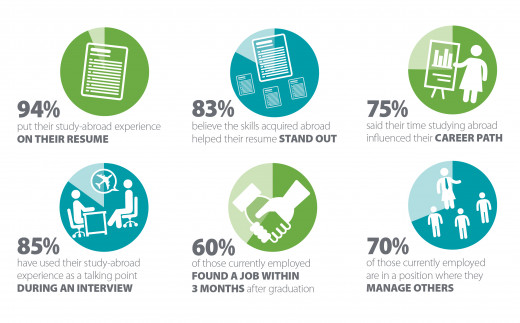10 Must Do Things at University
Going to university is about learning not just about your core majors, but also about yourself, the people you are surrounded by and the world you live in. For most people it will be the best opportunity you will get in your life to gain a wide range of life experience in such a short amount of time and some of the opportunities you'll receive as a university student will be hard if not impossible to find elsewhere.
Here are some tips on how you can make the most of your university experience and graduate with a brighter mind, stronger skill-set, impressive resume and plenty of fond memories to look back on.
Attend all your classes and sit at the front
You might think this goes without saying, but you'd be surprised at how many people fall off the wagon after high school and abuse the greater freedom they get at university.
Even if lectures are recorded, there is great value in attending in person. It gives you the opportunity to develop your listening skills (in the working world you can't pause and rewind the instructions your manager has given you!).
Sitting at the front will force you to pay greater attention, you are right under the lecturer or tutors and risk getting called out if you are dozing off! If there is a participation component to the class, it is easier to participate as you will feel more involved in the class being at the front as opposed to the back and if you have a quiet voice, you won't need to speak as loudly to get your point or question heard. It also gives you the opportunity to ask lecturers or tutors questions after the class finishes and get immediate feedback if you have difficulty understanding a concept.
If none of the above is good enough reason for you to attend all your classes and sit in the front, keep in mind that the more engaged you are in class, the more you will absorb, which means you will be in a better position to get high grades and your study burden will be reduced too, so you will have more time to do other activities, party and have fun!
Work on campus
Working on campus is a great way to earn money, gain work experience, meet students and staff.
University employers also understand your study commitments better and will be more flexible with your working hours than other employers typically would. It also reduces the need to travel to and/or from class to work, which means you can work more hours and fit them around your study schedule better.
Some of the opportunities that are available at most universities include:
- Tutoring classes or study groups
- Working in the library
- Working at the on-campus bookstores
- Working at on-campus bars, cafes and restaurants
- Fundraising for scholarships
- Student ambassador
Play sport
Sports are great way to keep active, fit and healthy, have fun and meet new people, especially from different majors to your own. Team sports in particular are great and will help you develop those teamwork skills that employers love.
If you aren't confident in your athletic ability, social sports competitions (intramural or intra-college) are the best option because as the athletic standard is much lower, the competition is friendly in nature and they don't require you to attend regular trainings multiple times during the week.

Volunteer
As a student you have the potential to do a lot of good in this world. Whilst your bank account might be close to empty, one thing you probably do have on your side is time you can volunteer to charitable causes (medicine/law/engineering students may disagree, but you still probably you should still have more time that the working masses!).
Volunteering is also a great way to meet other students and members of the public, develop your soft skills and possibly even learn new technical skills, not too mention it looks fantastic on the old resume.
Get to know your lecturers
Establishing personal contact with lectures has the potential to be of great value in a number of ways. Some lecturers teach 1000s of people per year, so if you don't speak to them you are just another student ID number to them, whereas if you do speak to them they may get to know you personally and can lead to you getting better treatment if you are having difficulty with the unit, need an extension and as much as it shouldn't, possibly better grades too.
Additionally, lecturers are great referees to have when you are going for a professional job and they may also have strong connections to the industry you are interested in working in, both of which could help you land your dream graduate job.

Get involved on the committee of a student club and society
Find a club or society at your university that interests you and actively get involved - go to all the meetings and events they hold and actively participate (don't just take a back seat role).
Clubs and societies are the best way to meet a lot of new people at university and develop friendships (especially if you don't live on campus).
Getting involved on the committee will give you the opportunity to develop your leadership, teamwork, problem solving and organisational skills, which employers value very highly.
If none of the clubs or societies at your university interest you, then develop one that does! This shows tremendous initiative and will help you develop invaluable entrepreneurial skills that will hold you in good stead should you want to start up and run your own business in the future.
Learn a new language
In a fast moving global economy speaking multiple languages can be a very valuable skill to have. Speaking a second language can open up new doors by giving you the ability to converse with a wider range of people which can help you secure jobs, meet new people and live and work in different countries. College is the best time to learn a new language as you are young so your ability is high and you have the time to be able to put the hours into studying and becoming proficient. If your course doesn't offer you the option to take classes in the language you want to learn, there are alternative options to learn such as online via websites and applications, as well as through clubs and societies at your universities, which may offer beginners classes and conversational groups.
Take a class outside of your major
Whilst your core major(s) will be the focal point of your time at university and perhaps your future career aspirations it can be beneficial to take a class that is outside of your major to broaden your thinking and gain different perspectives or just pursue something else you are passionate about.
For example, if you are studying finance, you might consider taking a class or classes in economics or psychology, both of which could be complimentary to your understanding of finance, as movement in financial markets is based on changes in the economic climate and also human psychology may help explain behaviors of financial market participants.
Did you study abroad whilst you were at university?
Go on student exchange or study abroad
Students that do an exchange semester or year abroad always mention it as the highlight of their university experience. It gives you the opportunity to experience living in a different country, learning about different cultures, possibly improving your language skills, learning to function independently, not to mention getting to travel and earn credits to your degree at the same time.
If you can't afford a full semester or year abroad, then consider short-term programs (depending on where you are you may be able to get low or no interest student loans to help fund your study abroad). Many of the bigger universities also offer scholarships for study abroad programs so work hard and apply!
There are also opportunities to do volunteer abroad through student organisations such as AIESEC, which could be a viable alternative if it is not possible to study abroad in your course or academic program.

Do an internship before graduating
With the number of graduates on the rise, the graduate employment market is becoming saturated and many graduates are struggling to find employment with graduate unemployment on the rise even in some of the world's strongest performing economies.
Whilst many companies are reducing there direct graduate hires they are still bringing many new employees into the company indirectly through their internship programs which typically target undergraduates in their penultimate year of study or earlier.
Internships offer a great way for undergraduates to gain experience, find out whether a job is right for them and potentially even secure graduate employment before graduating.









